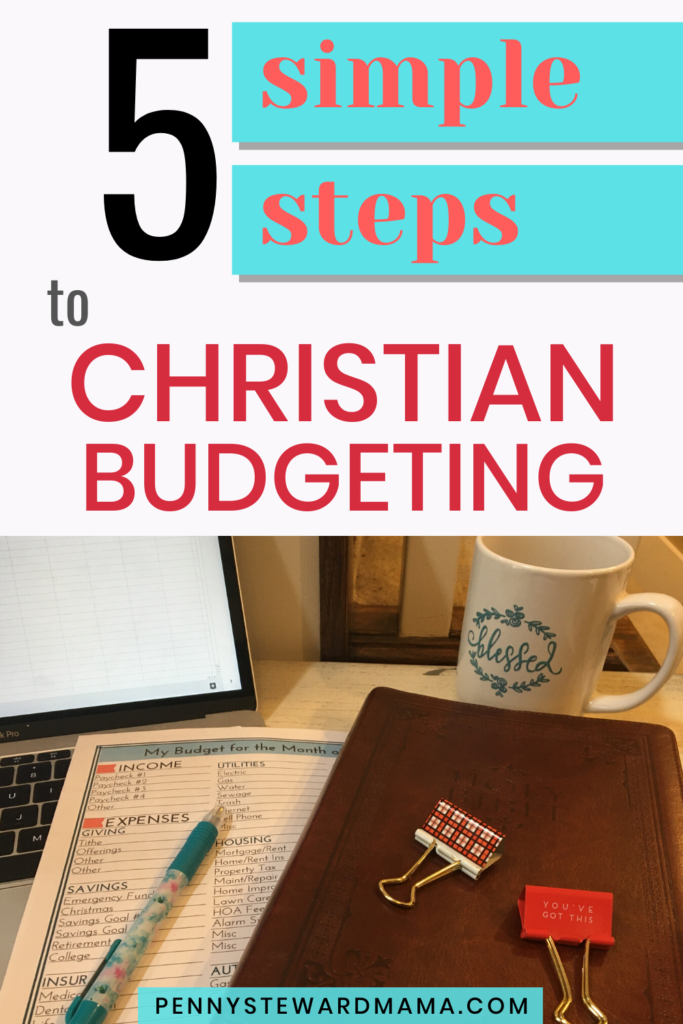Budgeting…it’s a dreaded word for many. But it doesn’t have to be! Especially in Christian households.
We are given a beautiful opportunity by the Lord to manage money He’s entrusted to us. If we can be good stewards of little, He will likely give us much! And a budget allows us to do just that!
So what exactly is a budget? And does Christian budgeting look any different from others’ budgets?
This blog post is designed to be a Christian budgeting guide. So let’s dive in!
 />
/>
The Basics of Christian Budgeting
Let’s start with the basic definition of a household budget. It’s simply a prioritized spending plan for your money. A budget allows you to tell your money where to go rather than wondering where it went. It’s a proactive approach to money management rather than the reactive approach that many end up succumbing to.
As Christians, budgeting takes on a whole new level of meaning and purpose. It allows us to be faithful stewards of the income the Lord has given us to manage.
***By the way, if you’re ready for a deeper dive into being a faithful steward of what God has given you, sign up for the 5 Day Email Challenge to begin building your financial house God’s way! It will seriously set you up to have your best financial year yet!***
Planning Ahead in order to be a Good Steward of our Finances
In Luke 14:28-30, Jesus discusses beginning a building project and planning for the expenses before beginning the project. He states how foolish it would be to lay the foundation then not have the funds to complete the entire project!
Yet, is this not what we do currently with our paychecks? It’s so easy to get paid, know that we have money in the bank, and get to spending. And then things get really tight and cause a lot of stress before the next paycheck comes. Plus we are not being good stewards if we’re not giving generously or saving responsibly!
How can this be avoided? A budget! We first must plan where every penny of our money is going, and then we must follow the plan.
By the way, did you know I have a “secret” mini-podcast walking you through Biblical financial principles and budgeting? Sign up here to get access to the De-Stress Your Money mini-podcast!
Where to Start when Budgeting as a Christian
One way the Christian budgeting process looks different from the world’s is in where to start. And it’s a big difference!
As Christians, we must start with prayer!! 
First, praise God for His provision — your income. Pray over what he would have you do with that income He’s entrusted you to manage. Pray that you can be faithful to actually do those things He’s calling you to do with money! That you can manage it well!
How to Make a Budget
After beginning with prayer, it’s time to write out your budget. I prefer to budget monthly, and I would highly recommend you work toward budgeting monthly as well. But you could also budget per paycheck to start.
Begin with whatever budgeting plan makes most sense to you at this point (monthly or by paycheck). Just be sure and get started!
***By the way, we host a budget challenge at the end of every month to jumpstart us into the next month! If you’d like to do this budgeting thing with some added accountability, sign up for the budget challenge here! Plus you’ll get a one-page printable budget worksheet to get started very easily!***
Now, on to the steps of how to make a budget!
1) Start with your income.
Write down what you will get paid.
This sounds simple and to the point, but many people don’t know their exact income. So write it down and make sure you KNOW it!
If you have an irregular income, write down your best estimate of what you will make, staying on the lower end if you’re really unsure. You can always adjust and take care of more priorities as your income increases.
This is something I help clients with all the time — irregular and variable income — so know that the more you practice planning ahead with this, the better you will get!
 />
/>
2) Next, as Christians, it’s our responsibility to prioritize tithing.
I believe our very first budget line item should be our 10% tithe. Just automatically, that goes back to the Lord.
Now, I’m aware how controversial the subject of tithing can be in the Christian community, but much of Scripture backs up a 10% tithe. Even by definition, a tithe is “a tenth part.”
What better way can we honor our Lord who has been so faithful to provide for us than by giving back to Him!
Here are some verses that back up tithing as well:
Proverbs 3:9 tells us to “Honor the Lord with your wealth, with the firstfruits of all your crops.” So, off the top, as soon as we are paid, we should be giving.
Malachi 3:10 “Bring the whole tithe into the storehouse, that there may be food in my house. Test me in this,” says the Lord Almighty, “and see if I will not throw open the floodgates of heaven and pour out so much blessing that there will not be room enough to store it.”
Do we believe that if we honor Him in our giving, that He will allow it to be multiplied and stretched beyond what we ever imagined?!
I have seen and heard many stories of the Lord’s faithfulness in providing even when the numbers don’t work out. So, let’s start with giving!
3) After prioritizing our tithe, we are to save wisely. 
We must be like the ants in Proverbs 6:6-8. They saved during the summertime in order to have provisions in the winter. The summertime was a season of abundance for them. The wintertime was a season of scarce resources.
At a minimum, we must be saving for the leaner seasons — whether they be expected or unexpected.
A good starting point when beginning to budget is to save a small emergency fund of $1000.
After that goal is met is when to begin using your “extra” money to pay off consumer debt.
Once that debt is paid off, you can go back to saving a larger emergency fund (3 to 6 months of household expenses) as well as begin saving for those long-term financial goals like retirement.
As Christians, we are put in a tricky position when it comes to saving. We must be careful not to save too much, or hoard. That money could be used now for God’s kingdom!!
Yet we also must be responsible and save what is needed for the future.
Again, this is why we must begin our budgeting with prayer! We can manage money using Biblical principles, but we must cover our money management in prayer to make sure we’re being obedient to what He desires in whatever season of life we’re in!
By the way…did you know I have a Facebook community where we can openly discuss Biblical finance principles and budgeting with fellow Christians? Join the Facebook community here!
4) Next, determine the amounts of your bills and expenses.
After listing your tithe and savings goals, list all your bills and expenses under where your wrote your income. This includes debt payments.
This proactive approach to your money can be very new. It may make things easier to print the last 2 to 3 months of bank statements to gain a better idea of how much you’re spending on what.
Just get ready for an eye-opening experience! But please don’t stress about it. This is setting you up for better stewardship of your finances in the future!
Also, to make sure you don’t forget about anything, here’s an extensive list of budget categories.
I originally learned how to budget using a very popular Dave Ramsey book that has helped guide millions to financial freedom. If you want an easy, inspiring read to help you budget as well as get out of debt, check it out!
5) Budget using the zero-based budget just like a Dave Ramsey budget
When you are finished listing everything, subtract your bills and expenses from your income.
At this point, you could end up with one of three scenarios.
The scenario you should aim for: A zero balance
You want to budget every penny of your income so that you stay in control of your money, instead of it controlling you. Ideally, that budget will include some extra money for saving, debt payoff, or giving. You still plan for those, though, and those items become “expenses” within your budget.
The unwanted scenario: If this total turns out negative, you’ll have to go back through your numbers, and see how you can adjust to make that number equal zero.
Here are some things to think through to adjust and get your budget to balance:
- What subscriptions can you cancel to save money?
- What expenses can you reduce or even eliminate?
- What can you do to earn extra money?
Think about what you can do to make the numbers work for the future!
 />
/>
Now, we come to the last scenario: You have extra money left over!!
If you fall into this category, you get to make some really fun decisions!
- Do you have your separate emergency fund savings?
- Do you have consumer debt to pay off? Remember, the borrower is slave to the lender. The sooner you can be free from debt, the better! You can use that extra to pay off debt!
- Has the Lord been leading you to give above and beyond the tithe? If you came out in this budget scenario, congrats! You are about to experience how fun and freeing it is to give generously!!
- Also think about what savings goals you would like to have for you and your family?
- Is it time for a vacation to enjoy some quality family time away from home?
- Do you need to bulk up retirement?
- What about kids’ college savings?
The possibilities are endless when the Lord provides “extra” money and you steward it well!
***No matter which scenario you end up with, check out the 5 Day Challenge to build your financial house God’s way. You’ll gain knowledge from God’s Word about money as well as practical application to know what to do next with your money!***
To summarize, a budget is a way to be faithful stewards of the finances we’ve been given to manage. We accomplish that by covering our budgets in prayer, and then intentionally planning how we will give, save, and spend our income.
My prayer and hope is that you now view managing your finances in a new light, and that God blesses you beyond measure as you steward your money well! Happy budgeting, friend 🙂
Oh, and one last thing…
If you feel like you’ve tried all the things and just can’t figure out how to budget on your own…
and you know you make too much money to be living paycheck to paycheck…
my 1:1 Fast-Track to Financial Freedom coaching program is to help you learn how to align your budget with your life and go after the the things God has called you to without money being a hindrance! If you are a solopreneur or self-employed, I specialize in helping you as well! Apply here for my coaching program and let’s get you well on your way to the financial freedom God has for you!


I appreciate this post. Thanks for this.
Thank you for the wonderful Godly money saving tips.
Thank you v. Much, been an eye opener and a blessing to me.